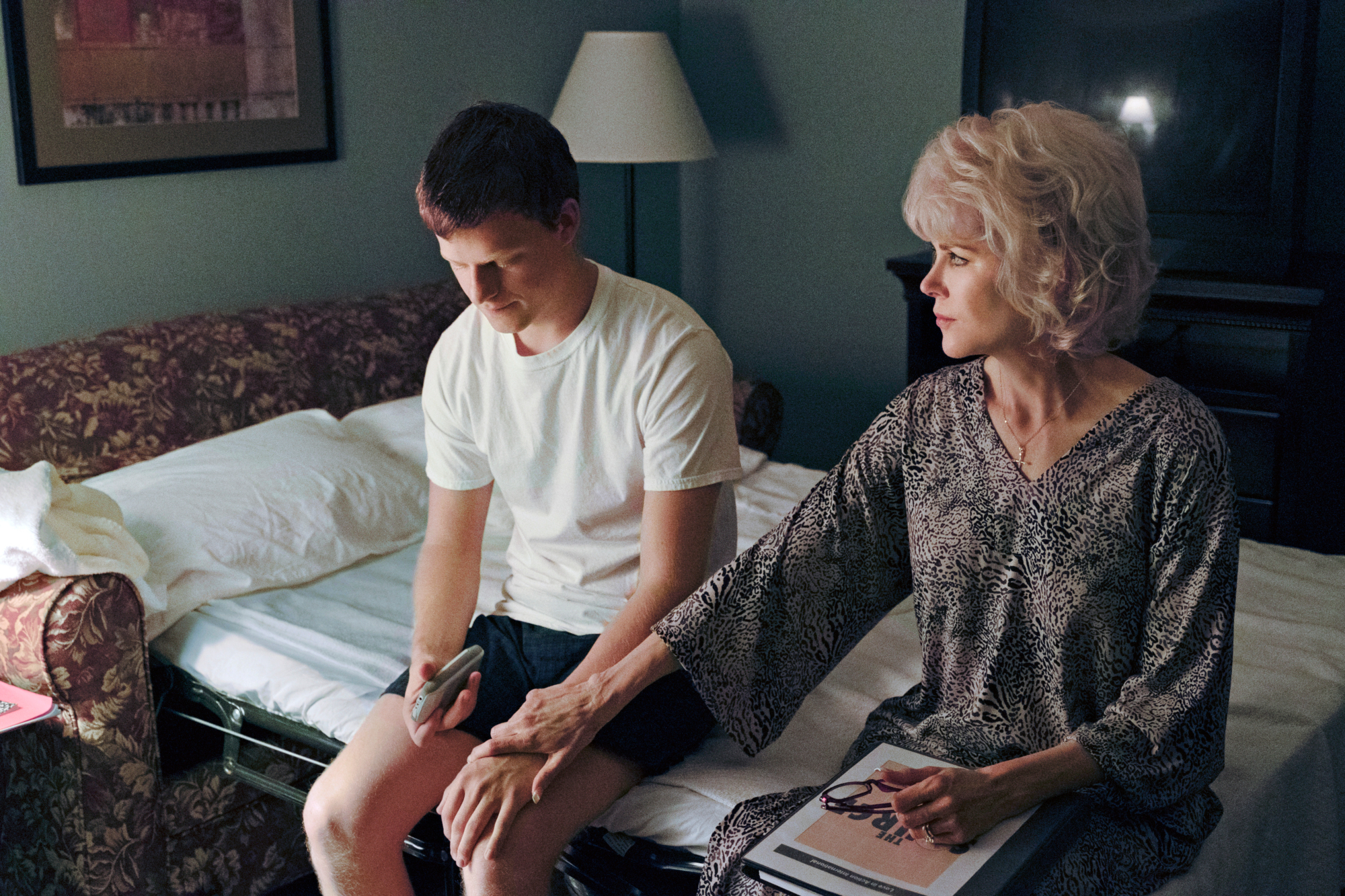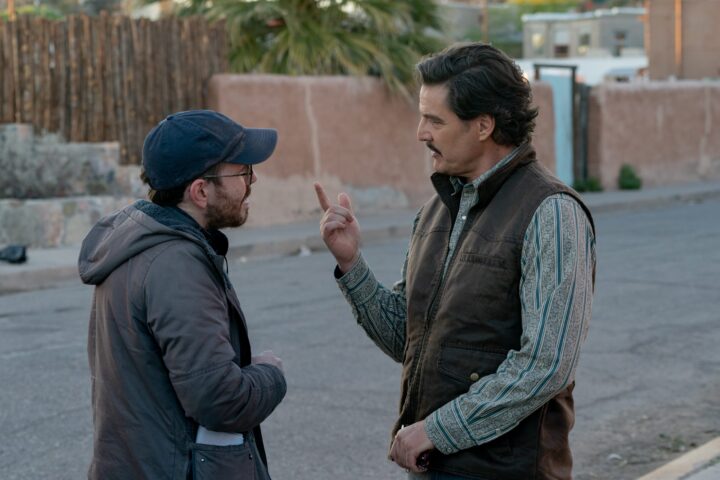Joel Edgerton’s Boy Erased, one of the year’s best-acted movies, is an “issue” movie done so well it far surpasses another well-meaning, troubled teen picture this season.
Both movies are about real-life teens in crisis—one forced into gay conversion “therapy,” the other in the vice grip of crystal meth addiction. Both deploy flashback structures and anecdotal memories to get to the heart of their subjects. Yet where Beautiful Boy lacks dimensionality in its PSA-feeling traumas, Boy Erased, by contrast, is a well observed, involving movie with sympathetic people thrust into a situation which, like powder keg on a short fuse, combusts into a scorching drama.
Based on Garrard Conley’s 2016 memoir of the same name and directed by the fine Australian actor Joel Edgerton, Boy Erased stars Lucas Hedges as Jared Eamons, an eighteen-year-old Arkansas senior who it appears, at least on the surface, has it made. Well mannered, smart and all-American cute, he’s the basketball playing son of a small-town Baptist minister and a southern belle mom, has a devoted sweetheart, college prospects and an inevitable future inheritance of the family’s Ford dealership.
But Jared has a secret—he’s gay, or at least thinks he may be—and a painful college episode forces him out of the closet. “I think about men,” he tells his shocked parents, and given the southern evangelical milieu and his father’s fundamentalist beliefs, things quickly devolve.
Father Marshall (Russell Crowe) informs his son that God has generously granted men and women the all-important gift of procreation, and immediately seeks the counsel of church elders in a scene of deliberation where mother Nancy (Nicole Kidman) assumes her de facto position in silent support of her husband’s decisions.
“Do you want to change?” his father asks him, before quickly shuttling him off to a restrictive, highly secretive re-education center named Love in Action that seeks to return gay teens to heterosexuality through a demented curriculum of self-analysis, equal parts shame and religious fanaticism, led by one Victor Sykes (Edgerton), a self-anointed therapist and savior whose group confessionals point a finger at the kids’ fathers as the source of their “behaviors.” There’s systematic manipulation, abuse and as expected, rampant homophobia in Sykes’ unorthodox methods, which include everything from adopting a “masculine stance” to authoritative baseball posture to far darker punishments.
Edgerton depicts the facility as a gray, cold prison devoid of outside influences and where contact with others is forbidden. But away from the hawk eyes of the center’s minions, Jared temporarily befriends Gary (pop singer Troye Sivan), a realist just putting in time and who tells him to “fake it until he makes it.” There’s also an angry ex-military kid who is perpetually bruised (this is never explained), and he’s played by filmmaker Xavier Dolan as a jumble of self-loathing. But it’s a husky, withdrawn former ballplayer (Britton Sear Cameron), whose indiscretions lead to his ignominy and reveal center’s barbaric true agenda.
Edgerton directs himself to an understated, effective performance as a drawling, dim bulb with his own issues (which come to late in the film’s closing credits) who suggests Jared stop reading Lolita, drop out of college and become a full-time devotee of the center’s curriculum. The Love in Action program is also presided over by a handful of creepy supporting characters, notably Red Hot Chili Peppers alum Flea as a threatening, ex-con drill sergeant type. There’s no real complexity (nor should there be) to how Edgerton, or the dismayed preview audience with whom I saw the film, view the clear dehumanization of the ex-gay movement.
Like Jared we know that he’s too smart for all this, and he amuses himself by noting the program manual’s many spelling errors (God is spelled as “Dog”). But that’s the only moment of levity in a fire-and-brimstone incarceration from which he’s allowed to leave only in the evenings, retiring to a local hotel where he shares a room with mother Nancy, increasingly suspicious about the center’s goings-on.
This brings us to the picture’s apex moment—for which both Jared and the audience have been impatiently waiting—where Kidman steps up, and shows up, in a heroic scene of immense gratification. The actress, decked out in a poofy blonde ‘do wig, suburban mom garb and a genteel sheen, so beautifully morphs from southern civility to protective mama bear, and one whose actions will force a personal and marital reckoning, that she seems sure to be Oscar nominated this year.
In recent years Kidman has approached Streep-level versatility and displayed acute emotional empathy, never more than here in a hotel restaurant scene where she confirms support for her troubled son. Later in the picture, her marriage suffers over her choices. “I love God and God loves me, and I love my son,” she explains. Rarely does American movie dialogue elicit such poignancy.
Crowe is solid in a less showy role, but to my ear his delivery of a final exchange is hurried and less introspective than might have been. The scene, a moment of small talk between father and son that unexpectedly goes deep, coveys his character’s struggle with his fundamental interpretation of the Bible and its inability to reconcile with his son’s identity, which now includes speaking his truth regardless of consequences. “You’ll have to be the one to change,” Jared informs his father, if they are to go forward.
The screenplay, adapted by Edgerton from Conley’s memoir, fluidly moves between past and present including a lovely, chaste scene with another young man (Theodore Pellerin) who assures Jared that “God won’t strike him dead” if for merely being who he is. The cast, peculiarly, is stacked with Australian heavyweights and like last year’s Three Billboards Outside Ebbing, Missouri, suggests a novel outsiders’ view of American mores. Or perhaps it just means that people are people, and such distinctions irrelevant.
Ultimately the picture belongs to Hedges, the introspective young star of Manchester by the Sea, Three Billboards Outside Ebbing, Missouri and Lady Bird is having a banner year with current turns in Mid90s, Ben is Back and his work here, which may be the Oscar nominee’s most mature work yet. He played “gay” in Lady Bird, sure, but in Boy Erased he gives full weight to the dilemma of coming out under duress and navigating its familial aftershocks, and the confusion of both acknowledging and resisting his identity while being programmed for self-loathing.
The film’s closing informs us that 77,000 youths are trapped in such draconian practices—still legal in many states—and while the information is important, what one remembers here is the family’s struggle for understanding and reconciliation. Rarely have photos of real-life counterparts, a now familiar trope of biopics, felt so hard won.
3 1/2 stars.



